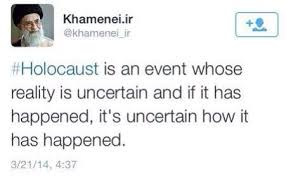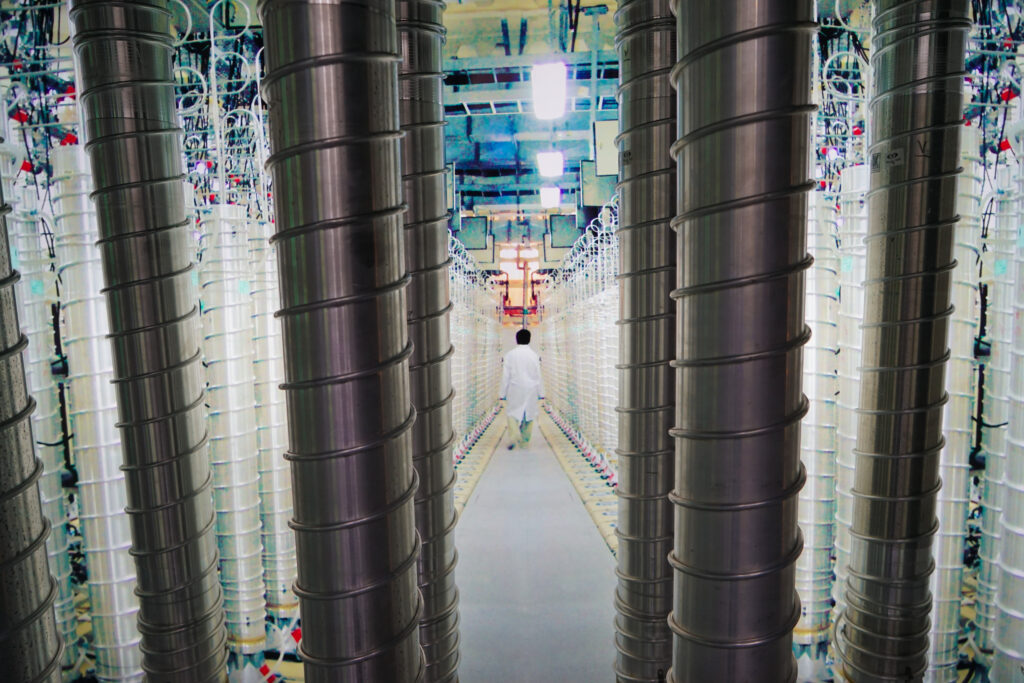UPDATES
Khamenei’s Holocaust denial exposes a larger problem of Iranian antisemitism
April 3, 2014 | Or Avi Guy

Or Avi-Guy
“Holocaust is an event whose reality is uncertain and if it has happened, it’s uncertain how it has happened” read a tweet on the Twitter account of Iranian Supreme Leader Ayatollah Ali Khamenei, believed to be operated by his staff – @Khameini.ir. It was reportedly a quote from his Norwuz (Persian New Year) address, given in front of a large audience in the city of Mashhad.
Holocaust denial and antisemitism in general are by no means new themes for Khamenei. His former president Mahmoud Ahmadinejad got considerable media attention for his practice of frequently stating that the Holocaust was a ‘fairy tale’ and a ‘myth’. It is less well-know that the Supreme Leader has also made similar claims, albeit less frequently – for instance in 2006 he spoke of “the myth of the massacre of Jews known as the holocaust.”
Yet given Iranian President Hassan Rouhani’s so-called “charm offensive” and claimed “moderation”, and the renewed diplomatic talks about nuclear issues between Iran and the international community, the Supreme Leader’s comments are an important reminder of the real beliefs, ideology and objectives which underpin the Iranian regime.
Khamenei, ironically, also criticised the West for a supposed lack of freedom of speech regarding the Holocaust. During his address, he reportedly stated that “expressing opinion about the Holocaust, or casting doubt on it, is one of the greatest sins in the West. They prevent this, arrest the doubters, try them while claiming to be a free country.” Some of his other tweets read: “absolute freedom doesn’t exist anywhere in the world. Even countries that claim to have freedom set red lines on which they’re utterly strict” and asked “Does anybody dare talk about Holocaust in Europe?”
Also unsettling was Khamenei’s comment regarding the Israeli-Palestinian peace talks, broadcast on Iran’s Press TV, arguing that the American efforts “failed in Palestine” and “did not work and, God willing, will not work either.” He described the Israeli position regarding recognition as a the nation-state of the Jewish people as an attempt to “turn Palestine into a country where Muslims and Christians cannot live; to terminate Palestine, so to speak.” In other words, Khamenei is implying that Israel is planning to cleanse itself of its non-Jewish population. This statement can be seen as an attempt to justify hostility or violence towards Israel under the pretext of defending minorities from such fictitious horrors.
The Iranian leadership, since Rouhani was elected president, has been trying to improve its image and its position within the international community, while not actually giving up any of its destabilising efforts in the region – from Gaza to Lebanon to Bahrain to Yemen to Syria and especially regarding Iran’s own illegal nuclear efforts. In this context, the antisemitic remarks reveal how transparent is the veil of so called moderation under which the regime – led by Khamenei, not Rouhani – is hiding its true nature and intentions.
Yet some observers of the region seem all too eager to accept Rouhani’s re-branding attempts. When the Iranian President gave an interview to CNN‘s Christiane Amanpour in September 2013 and acknowledged that it was a “crime” that Jews died at the hands of the Nazis during WWII, he was praised by many commentators in the West for admitting that the Holocaust actually took place. In Iran, his so-called recognition of the Holocaust enraged political opponents, while his office claimed that he has been mistranslated.
But Rouhani never actually came close to acknowledging the systematic killing of six million Jews in Europe. He did what many Holocaust revisionists do – admit that some “crimes” took place, without accepting the full figure or its systematic nature, and while over-emphasising that Jews were merely one of many groups to be persecuted by the Nazis. He said that since he is “not an historian”, he would not comment on any specific details of the Holocaust. It is not even clear whether he even used the word “Holocaust” at all, or just referred to criminal actions by the Nazis.
Is this slight transition from complete Holocaust denial to barest acknowledgement that perhaps some Nazis did some bad things to Jews among many other people a sign of Rouhani’s moderation? No. It is just part of his “charm offensive” – an attempt to appear more reasonable to Western audiences, compared with his ostentatiously confrontational predecessor. However, in Iran the president is at most the third most powerful figure in the regime, and the last word lies with the Supreme Leader. Further, as Khamenei’s tweet reveals, there is no shift in Iranian policy or views of the Holocaust.
German scholar Dr. Matthias Kuntzel, in a recent lecture, explained the sources and reality of the wider culture and ideology of antisemitism in Iran. Kuntzel describes the Iranian version of this racist belief system as a result of the interaction between traditional Islamic anti-Judaism, the influence of Nazi propaganda during World War II and, under the current regime, the antisemitism espoused by revered regime founder Ayatollah Ruhollah Khomeni.
These factors, Kuntzel argues, created an environment which made Ahmadinejad’s antisemitism possible – the use of the word ‘Zionist’ with “exactly the same meaning Hitler poured into ‘Jew'”, Holocaust denial and so on. Yet, Kuntzel emphasised:
“Ahmadinejad’s portrayal of the Shoah was neither a new nor a personal obsession but rather an intensification of themes long prominent in the Islamic Repubic’s Ideological discourse.”
And these themes continue to exist even if the previous leading advocate is currently out of office, he noted.
Of Rouhani’s so-called “recognition” of the Holocaust, Kuntzel commented that:
“to pretend that the facts of the Holocaust are a matter of serious historical dispute and available only for historians is a classic rhetorical evasion,” before adding that “the mainstream thinking among Iran’s rulers is even worse. They have no doubt that the complete denial of the Holocaust remains an essential part of Iran’s state ideology.”
Khamenei’s address certainly appears to prove Kuntzel’s point.
And in case anyone might still believe that Rouhani’s views are different just because he uses different language and tone, Kuntzel notes that Rouhani still makes public conspiratorial statements about “international Zionism” and about Israel’s alleged global influence. He wonders:
“Rouhani has abandoned the most excessive anti-Semitic ranting and replaced it with somewhat more sober anti-Semitic ranting. Does that constitute an improvement?
Yes, it does. And at the same time: No it does not. For there is a disturbing tendency in the West to be satisfied or even relieved with everything less radical than Ahmadinejad.
While the totalitarian character of this regime has remained constant, the world’s media perception of the Islamic republic of Iran has changed dramatically. Most politicians and journalists in the West have a good feeling about the new Iranian president. They do not want to spoil this feeling by looking too closely at what Rouhani or his boss Khamenei actually say and do. They would rather let themselves to be taken in by the new Iranian government’s public relations spin than to recognise the unchanging policy that underlies it.”
The Iranian leadership has long tried to argue that they are anti-Zionist, not antisemitic. Public statements by the country’s leaders clearly prove otherwise, even if they are occasionally clever enough to disguise traditional and clear antisemitic claims by substituting the word “Zionist” for the word “Jew.”
Furthermore, Iran’s actions also prove that the leadership isn’t simply “talking the talk’. From the nuclear program, state-sponsored terrorism and arms shipments to Gaza, such as the recently interdicted Klos C, they are clearly willing to “walk the walk”.
Khamenei’s statements should be a useful reminder of these underlying realities – if the world is not too caught up in wishful thinking about supposed current “moderation” and the likelihood of a future diplomatic entente to notice.
Tags: Antisemitism





